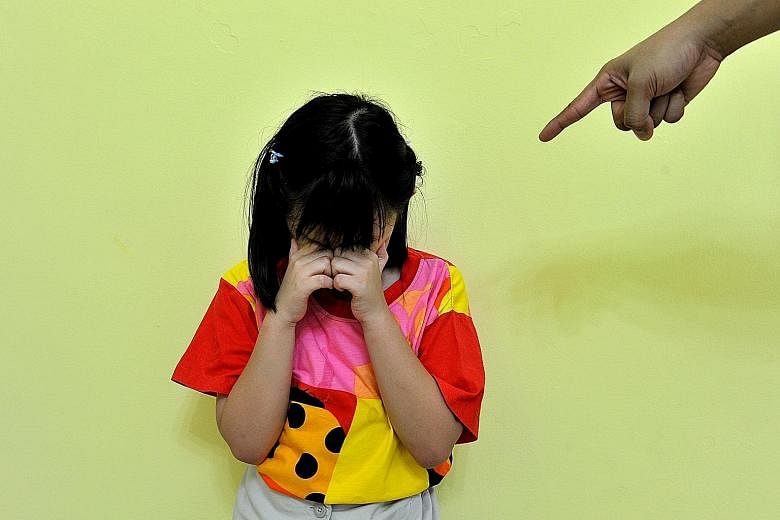Occasional temper tantrums are a normal growing-up phase for very young children learning to control their emotions. But what if those explosive meltdowns continue well into the tween years?
For almost two years, 32-year-old stay-at-home mother Rosmaira Ramli bore the brunt of her 11-year-old daughter's daily tirades.
At her wits' end, she sought professional help two years ago.
"There was a lot of yelling, feet stamping and door banging every day. Sometimes, she would throw things too. It was emotionally exhausting to manage her angry outbursts every day," said Ms Rosmaira, who has two other children aged 13 and six.
Increasingly, professionals say they are seeing a rising number of angry children.
To address the growing problem, the Singapore Children's Society (SCS) set up an anger-management programme called Storm Riders in 2010. Targeted at children in the upper-primary levels, it is run by social workers and counsellors who impart skills to help children manage their anger issues through interactive activities.

In the last five years, the intervention programme run by the society has expanded from one to five children and youth service centres.
SCS has also recently begun training school counsellors to run the programme independently in schools, said Ms Jenny Giam, assistant director of Sunbeam Place by SCS.
The Institute of Mental Health's (IMH) Child Guidance Clinics saw an average of about 5,200 children and teens a year from 2011 to 2013. About 2.5 per cent of the group were diagnosed with conduct and impulse-control disorders.
Anger is a common emotion experienced by this group of children, who have problems controlling their feelings and behaviour.
When not nipped in the bud, poorly managed anger often leads to aggressive behaviour, said Ms Jillian Boon, senior educational psychologist at IMH's department of child and adolescent psychiatry.
She said that children who cannot control their anger tend to misinterpret social situations and respond in a negative manner.
"Because of their anger issues, they often cannot get along with their peers and may get into frequent fights in school. Their parents typically also have problems managing their behaviour," said Ms Giam.
Aggression was the most common behavioural concern highlighted by school counsellors, based on findings from the Reach (Response, Early intervention and Assessment in Community Mental Health) programme, said Mr Jeffrey Ong, senior clinical psychologist at IMH's department of child and adolescent psychiatry. Reach is a community mental healthcare service set up to support students aged six to 19 with emotional, social and behavioural issues.
Recognising a need to help children manage their anger in a healthier manner, IMH developed a series of role-playing mobile app games in 2013. It is targeted at children aged seven to 12.
In the game Regnatales, which can be downloaded for free, the player has to save his parents from an evil villain by facing challenges that test his patience and self-control.
While anger is not necessarily a "bad" emotion, it can become a problem when poorly managed or when expressed in an aggressive or destructive manner.
For one thing, it causes the body to release stress hormones that put it in a "fight or flight" mode. "Unresolved persistent anger would mean that the body is constantly stressed and has to cope with a lot of these stress hormones," said Ms Boon.
This may lead to health and emotional problems such as poorer immunity, sleep and concentration problems, fatigue and headaches.
Experts say children who have difficulties managing their anger run a higher risk of emotional problems like depression and addictions.
That rage may not always manifest outwardly, said Ms Giam.
There are silent types who turn their anger inward. Pupils as young as 10 inflict cuts and wounds on themselves whenever they feel angry or upset because they do not know how to express themselves in a healthy manner, she said.
Dealing with an emotionally intense child can be a perplexing and frustrating experience.
"There were times when I felt like I had failed as a mum. I couldn't understand why my daughter was always so angry and acting up," said Ms Rosmaira.
Stress from school or home, such as learning difficulties or marital conflicts, is one of the main culprits, said Dr Sanveen Kang-Sadhnani, principal clinical psychologist and centre manager at Thomson Paediatric Centre - The Child Development Centre.
Add bad parenting into the mix, and that could tip an angry child over the edge.
Ms Giam points out it is also not uncommon for parents themselves to have trouble regulating their intense emotions or have anger issues stemming from their childhood.
When parents have unresolved anger issues, they are roped in to attend family therapy, she said.
Dr Sanveen said caregivers do not realise that responding angrily - either by yelling or using physical force like caning - to a child's temper tantrums often has unhelpful consequences.
"This can be confusing for the child because the adults are not practising what they preach," she said.
Children model and learn from their parents how to respond emotionally, said Ms Boon.
Instead of dismissing her daughter's frequent outbursts as a growing-up phase, Ms Rosmaira found the right professional help.
After attending the SCS' Storm Riders programme, her daughter has mellowed considerably. Ms Rosmaira has also learnt to give her time and space to calm down whenever she gets emotional.
"She has a better relationship with her friends and siblings now. Even her attitude towards school work has become more positive; she now does her homework without resistance," she said.
"I strongly urge parents who have trouble managing their kid's anger to seek professional help and not assume it's just puberty or hormones," she added. But beyond professional counselling, change must first come from parents.
• This article first appeared in Young Parents magazine. Young Parents, published by SPH Magazines, is available in both digital and print formats. Log on to www.youngparents.com.sg/subscription to subscribe and for more parenting stories.

